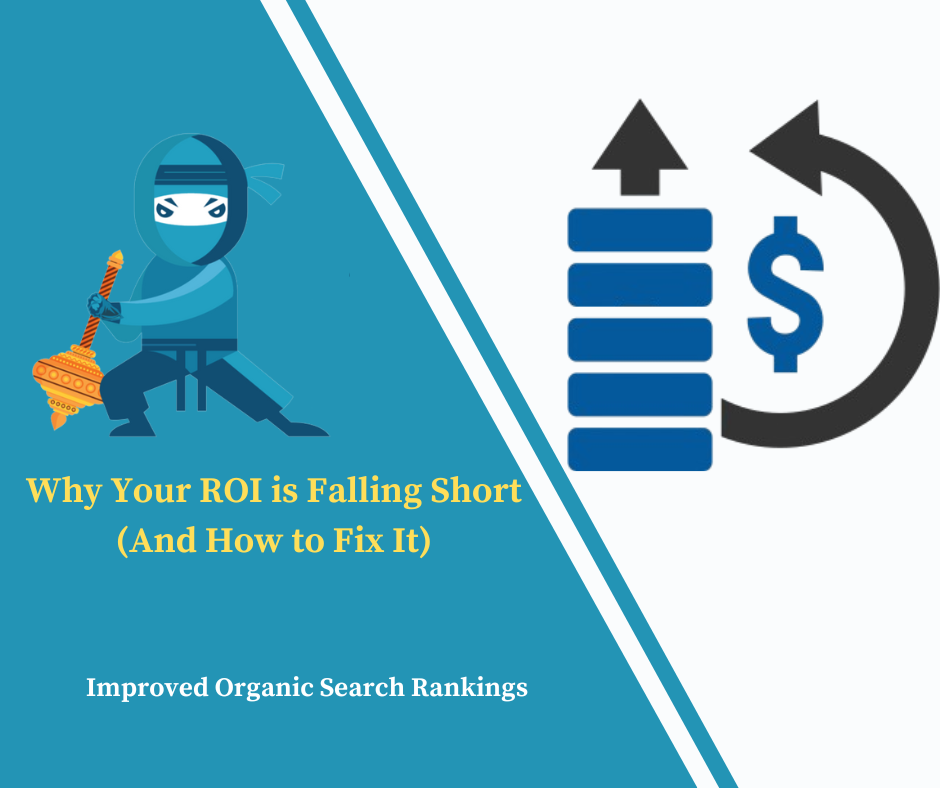Why Your ROI is Falling Short (And How to Fix It)
In today’s fast-paced business environment, achieving a high Return on Investment (ROI) is crucial for maintaining profitability and sustaining growth. However, many businesses find themselves facing the frustrating reality that their ROI is falling short of expectations. This article delves into the common reasons why your ROI might be underperforming and offers actionable strategies to rectify the situation.
Understanding ROI and Its Importance
ROI, or Return on Investment, is a performance measure used to evaluate the efficiency of an investment. It is calculated by dividing the net profit from an investment by its cost and multiplying by 100 to get a percentage. A higher ROI indicates that an investment is yielding good returns, while a lower ROI suggests that the returns are not meeting expectations.
Common Reasons Your ROI is Falling Short
1. Ineffective Marketing Strategies
One of the primary reasons for a disappointing ROI is ineffective marketing strategies. If your marketing efforts are not targeting the right audience or if the campaigns are poorly executed, your investments may not generate the desired returns.
Solution: Conduct a thorough market analysis to ensure your marketing strategies align with your target audience’s preferences and behaviors. Utilize tools like Google Analytics and social media insights to track campaign performance and adjust your strategies accordingly.
2. High Operational Costs
High operational costs can erode your profit margins and negatively impact your ROI. Expenses such as production costs, labor, and overhead can all contribute to a diminished return.
Solution: Evaluate your operational expenses and identify areas where you can reduce costs without compromising quality. Implementing cost-saving measures and optimizing resource allocation can help improve your ROI.
3. Poor Financial Management
Inadequate financial management can lead to inefficient use of resources and missed investment opportunities. If your financial planning and budgeting are not up to par, your ROI may suffer as a result.
Solution: Review your financial management practices and consider employing financial planning tools or consulting with a financial advisor. Effective budgeting and financial planning can help you allocate resources more efficiently and enhance your ROI.
Also read: The Ultimate Guide to Increasing Your ROI
4. Low Product or Service Quality
Offering products or services that do not meet customer expectations can lead to low sales and, consequently, a poor ROI. Customer satisfaction is closely linked to your financial performance.
Solution: Invest in quality control and continuously seek feedback from customers to identify and address issues with your products or services. Enhancing quality can lead to increased customer satisfaction and higher returns.
5. Inefficient Sales Processes
An inefficient sales process can hinder your ability to convert leads into paying customers, affecting your ROI. Sales inefficiencies can arise from outdated techniques, lack of training, or poor lead management.
Solution: Optimize your sales processes by adopting modern sales tools and techniques. Provide your sales team with ongoing training and support to ensure they are equipped to close deals effectively.
6. Lack of Data-Driven Decision Making
Relying on intuition rather than data when making business decisions can lead to suboptimal outcomes. Without proper data analysis, you may miss opportunities to improve your ROI.
Solution: Implement data analytics tools to gather and analyze relevant business data. Use these insights to make informed decisions and adjust your strategies to improve ROI.
How to Fix Your ROI Issues
1. Set Clear Goals and KPIs
Establishing clear goals and Key Performance Indicators (KPIs) is essential for tracking ROI and measuring success. Define what you want to achieve and how you will measure progress.
2. Invest in Training and Development
Investing in employee training and development can lead to improved performance and efficiency, ultimately boosting ROI. Ensure your team is up-to-date with the latest skills and knowledge.
3. Leverage Technology and Automation
Utilize technology and automation tools to streamline processes and reduce manual effort. Automation can help cut costs and increase efficiency, leading to a better ROI.
4. Monitor and Adjust Your Strategies Regularly
Regularly review and adjust your business strategies to ensure they are aligned with your goals. Continuous monitoring allows you to identify areas for improvement and make necessary changes.
5. Focus on Customer Retention
Building strong relationships with existing customers can lead to repeat business and higher ROI. Implement customer retention strategies such as loyalty programs and personalized marketing.
6. Optimize Your Marketing Efforts
Continuously refine your marketing strategies to improve their effectiveness. Test different approaches, analyze results, and make data-driven adjustments to enhance ROI.
FAQ
What is ROI, and why is it important?
ROI, or Return on Investment, measures the profitability of an investment. It is important because it helps businesses evaluate the efficiency of their investments and determine whether they are generating positive returns.
What are the common reasons for a falling ROI?
Common reasons include ineffective marketing strategies, high operational costs, poor financial management, low product or service quality, inefficient sales processes, and lack of data-driven decision-making.
How can I improve my ROI?
Improving ROI can be achieved by setting clear goals, investing in training, leveraging technology, monitoring and adjusting strategies, focusing on customer retention, and optimizing marketing efforts.
What role does data play in improving ROI?
Data plays a crucial role in improving ROI by providing insights into business performance. Data-driven decision-making helps businesses identify areas for improvement and make informed adjustments to enhance ROI.
How can technology and automation impact ROI?
Technology and automation can impact ROI by increasing efficiency, reducing manual effort, and cutting costs. By streamlining processes, businesses can achieve better returns on their investments.
Why is customer retention important for ROI?
Customer retention is important for ROI because retaining existing customers leads to repeat business, which can be more cost-effective than acquiring new customers. High customer retention contributes to higher overall profitability.
What should I do if my financial management is lacking?
If your financial management is lacking, consider employing financial planning tools or consulting with a financial advisor. Improving budgeting, resource allocation, and financial oversight can enhance ROI.
How often should I review my business strategies?
Business strategies should be reviewed regularly to ensure they remain aligned with your goals. Continuous monitoring allows you to make necessary adjustments and improve ROI over time.
Can investing in employee training help with ROI?
Yes, investing in employee training can help improve ROI by enhancing employee performance and efficiency. Well-trained employees are more likely to contribute positively to the company’s financial outcomes.
What are some examples of technology that can boost ROI?
Examples of technology that can boost ROI include Customer Relationship Management (CRM) systems, marketing automation tools, data analytics platforms, and project management software. These tools help streamline processes and improve overall efficiency.
Conclusion
Understanding why your ROI is falling short is the first step towards improving it. By addressing common issues such as ineffective marketing, high operational costs, and poor financial management, you can implement strategies to boost your returns. Focus on data-driven decision-making, invest in technology and employee development, and regularly review your business strategies to achieve better ROI. With the right approach, you can turn your ROI around and drive your business toward greater profitability and success.








